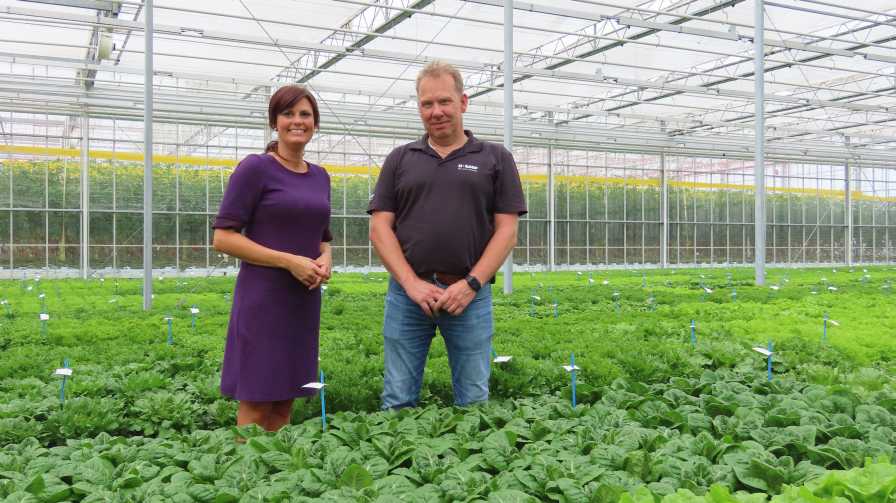
Anne Jancic, Marketing & Business Development High Tech, and Martin Voorberg, R&D Capital Investment Venture Manager at BASF Vegetable Seeds
BASF Vegetable Seeds is making progress in its application of autonomous growing concepts. The company has already applied the concept to seed production, cultivation of a tomato variety, and the screening of hydroponic lettuce varieties. A new project for cucumbers is also underway.
“At BASF Vegetable Seeds, we want to make healthy eating enjoyable and sustainable,” says Anne Jancic, Marketing & Business Development High Tech at BASF Vegetable Seeds. “We strongly believe in the development of a connected, data-driven, automated, and sustainable production system with consumers’ needs in mind.”
In autonomous growing, sensors, cameras, data collection, and analysis are used to predefine growing settings with the help of algorithms and artificial intelligence (AI). These integrated technologies can optimize inputs such as energy, water, and the balance of nutritional elements to create the most optimal conditions for growth. They can recognize environmental conditions that will impact yield, the predictability of yield, better handling of crop diseases as well as future fruit quality, flavor or nutritional content of vegetables and take actions in real time.
“Computers can make complex decisions much faster and learn based on outcomes much faster than we can,” Jancic says. “That does not mean that specialized growers are not needed anymore. It simply means that they will be able to do a better job using the opportunities offered by this technology.”
The goal is to provide a growing recipe for each variety BASF commercializes, Jancic says.
“The grower can visualize the performance of the variety during growth from a simple dashboard and get real-time digital feedback, enhancing the performance of our genetics and thus the profit of our customers.”
Progress in Partnerships
As integrated concepts like these require an integrated approach, BASF is working together with industry suppliers, research institutes, growers, and consultants.
Since May 2020, BASF Vegetable Seeds has been part of the AGROS program, a collaboration between Wageningen University & Research in The Netherlands and 26 private partners, looking into autonomous growing. The program focuses on optimized growing methods based on sensors, plant physiology, and artificial intelligence for cucumbers.
“By better understanding how plants react to their environment, we will develop genetics that are fully adapted to new growing systems,” says Peter Kraan, R&D Crop Coordinator for cucumbers at BASF. “In our new high-tech greenhouses, we digitally collect data on each individual fruit harvested. The ultimate goal is to develop better varieties.”
Last year, BASF partnered with Hoogendoorn Growth Management to gain experiences with various autonomous growing software and hardware for hydroponic lettuce and tomato. The modular software ensures that the available resources such as natural gas, fertilizers and water are used as efficiently as possible, helping to minimize costs and CO² emissions and to maximize crop profitability.
“We’ve seen massive opportunities to improve our own processes and to add value to our genetics. Using the principles of Growing by Plant Empowerment (GPE) to control the plant balances and optimize photosynthetic activity, we were able to significantly increase the growth speed of hydroponic lettuce while improving crop quality at the same time,” says Martin Voorberg, R&D Capital Investment Venture Manager at BASF Vegetable Seeds.
October 01, 2020 at 04:21AM
https://ift.tt/3l1Uzyx
How BASF is Investing in Autonomous Growing in Vegetables - Greenhouse Grower
https://ift.tt/2CyIOeE
Vegetable
No comments:
Post a Comment